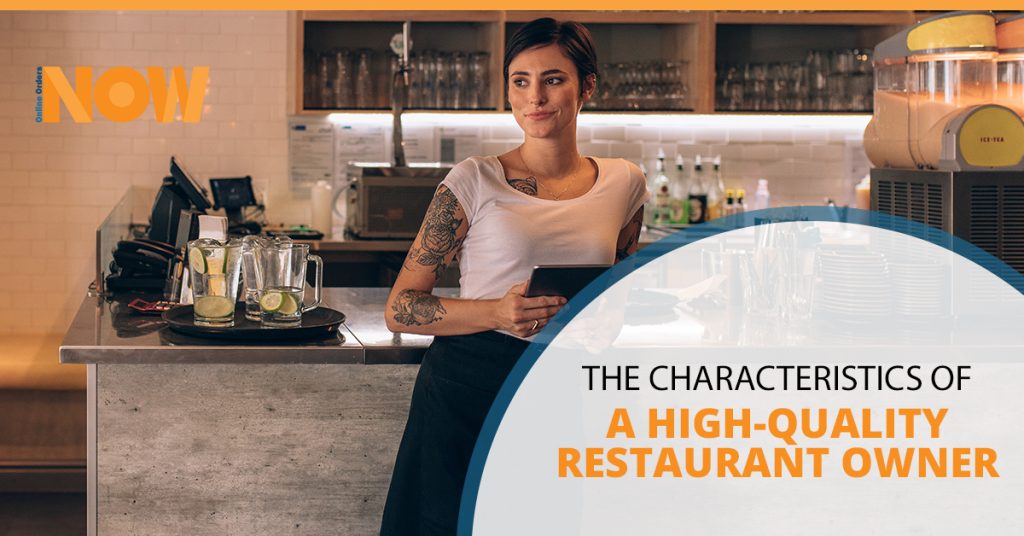In a few of our more recent posts, we took the time to talk about what kind of traits restaurant managers (and owners) should look to have while operating their business. It’s difficult to generalize too much because no two restaurants are alike. But in our experience at Online Orders Now, we’ve interacted with a wide range of restaurant types. This has given us a unique vantage point in the sense that we’ve been able to observe the dynamics of a variety of front-of-house and back-of-house staffs. We’d like to put that information to good use today, providing our restaurant-owner readers with some tips about how to effectively manage your staff.
Don’t get us wrong now, we aren’t experts on the subject, so we will be combining our experiential wisdom with a few outside sources. Plus, we have the utmost respect for restaurant owners. These are folks who wear so many different hats while putting out so many different fires each day on the job, it’s a wonder they have time to look to improve themselves at all!
For those of you who are looking for some tips to more effectively manage your restaurant employees, we are happy to oblige you! But not before we tip our proverbial caps in a show of respect. You folks are a rare breed and we are happy to work with you!
What We’ll Cover
Perhaps you are in the unfamiliar position of managing employees. You wanted to be an entrepreneur; more specifically, you wanted to be an independent business owner that offers delicious food to your patrons. But you never took a class on how to be someone’s boss — half the reason you wanted to own your own restaurant was so you could avoid the typical corporate world, and ending up in middle management is pretty high on your list of reasons to forego the typical business world!
Maybe that describes you, but maybe not. Either way, there’s a safe bet that you aren’t the world’s most perfect restaurant owner with regards to how you relate with your staff. That’s why in today’s post we will look at some common characteristics successful managers maintain — best practices to use along with bad habits worth avoiding. So whether you have been a restaurant manager for twenty days or twenty years, our intent is that this post will prompt some level of self-reflection so that you can ultimately improve the way you relate to your staff. Let’s get started!
Hire Well
Maybe you are brand new to hiring and you are able to start from scratch. You should count yourself lucky, because other readers might find themselves in a situation where they inherited a staff, hired out of desperation, or maybe simply have too many troublemakers on their staff to know what to do with. The advice that you need to “hire well” might sound a bit simplistic, but let’s break what that actually looks like.
Here’s a great place to start: find people who you can imagine spending a lot of time with. Because, believe us, you’ll be spending a lot of time with these individuals. You also need to think about hiring folks who line up with your restaurant’s values, vision, and general vibe. To the latter point, what kind of impression do you want your FOH staff to give to your customers? Warm? Professional? Classy? Fun? It really just depends on what you are looking for, and the good news is that you get to decide what you are looking for. Our two cents is that you simply make sure you are intentional about your choices.
To touch on the “values,” point, if you are unsure about what kind of values you are looking for your staff to align with, there’s no time like the present to decide for yourself what kind of philosophy and mission your restaurant will have. Don’t skip this just because you are short on time either; you have the unique opportunity to start a business from scratch. That’s a beautiful thing.
Accept Each Challenge
You don’t usually think of “acceptance” or even “denial” within the confines of a professional setting, but hear us out. While we are on the topic of starting things out the right way, one of the best pieces of advice we can offer new restaurant owners is that you should proactively accept each challenge before you. Not only should you accept it, but embracing the challenge will help things go even better for you. Obviously, acceptance is the first step on the road to embracing each of the (many) challenges you will face as a restauranteur.
Let’s put it another way. Maybe the most important thing you can do for yourself and your young, independent career to understand that being a restaurant owner is far from easy. If you are prepared to be taken out of your comfort zone, regularly, things will go better. Doing so might prompt you to seek help from an external source; perhaps someone with knowledge on the matter. Who knows, you might even find an extremely practical and well-written online resource to help you navigate such things. You can dream, at least!
Great Communication Is Open Communication
You want to do your best to set an example for what healthy communication looks like. And the thing is, there are plenty of bad examples of what poor communication looks like, especially with regards to conflict and openness. If you can foster a company culture from the top to bottom that truly values open communication (which involves taking the bad with the good), it’s going to go a long way to having a happy, productive staff.
Employees need to feel able to give their opinions without worrying about the potential negative ramifications of doing so. If they feel like they aren’t able to be honest with your, or leadership in general, they’ll be much more likely to express their opinion about you to everyone else who will listen to them — except it won’t involve respect or professionalism anymore. Conversely, having an office with an open door, so to speak, will significantly help with morale. It’s nice to be heard, and it’s nice to feel that you are able to be heard.
Let’s get a little more practical. Being open and communicative doesn’t only help with your staff not talking behind your balk (though that certainly has its value), it helps with productivity as well. If your employees don’t think they can present a potentially unpopular opinion, they won’t share their ideas about how a particular task or process could be optimized. This has a knock-on effect of good things happening as well; as you entertain and apply your staff’s ideas, they’ll feel like they have more ownership in the restaurant. They’ll be a part of the overall success. That investment leads to higher quality work being done in your restaurant. That’d be a very nice byproduct, we’d surmise.
There is more to open communication than simply being receptive to criticism, we have to warrant. It involves knowing when and how to address behavior and attitudes in your employees that you need to correct. It involves having relationship with them so they won’t hate you for it afterward. It involves being able to be calm enough to correct in a gentle manner in a one on one setting instead of blowing up on that staff person in front of your entire kitchen.
We can’t reiterate how much this point matters. We also can’t say it’s going to be easy, because working in a restaurant is an inherently stressful endeavor.
Start with giving your staff some love, and don’t stop doing it either. Encourage them, point out where they are doing well every five times for every one correction you offer. Doing so will not only keep everyone happier and more productive, but having a healthy staff means people will want to stick around for longer.
We are sure we don’t have to tell you that lower turnover is a very, very good thing for just about any kind of business!
Contact Online Orders Now!
We will continue where we left off in our next post, where will we be addressing the same topic. In the meantime, feel free to contact us at Online Orders Now for our online ordering system solution that will dramatically improve your overall bottom line. Contact us today to learn more!


